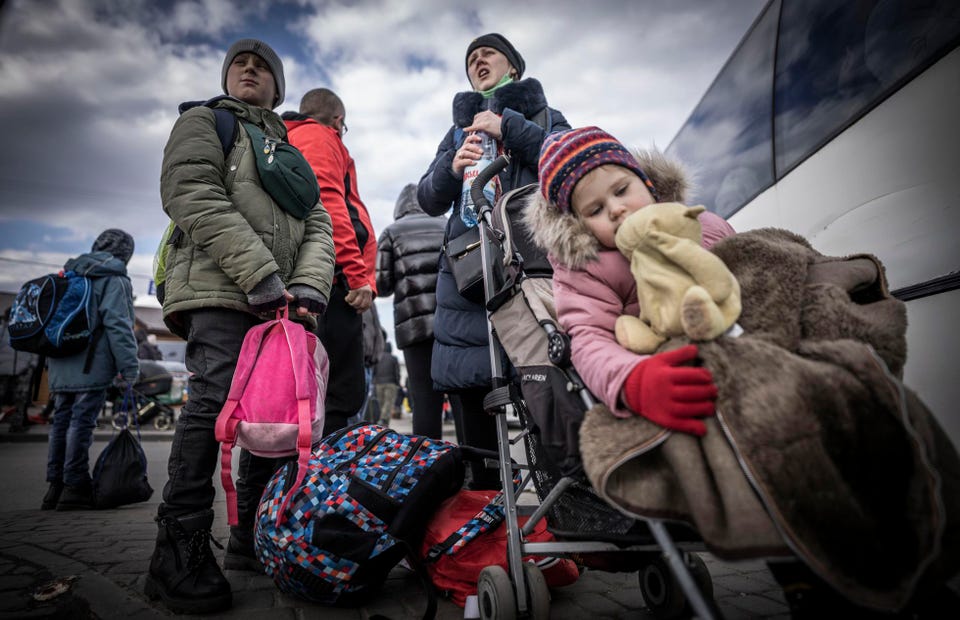The UK’s effort toward the Ukrainian refugee crisis has been described as weak, following weeks of unworkable bureaucracy hampering the visa application process for the fleeing refugees. About 3.9 million Ukraine residents have been forcefully displaced from the country following the Russian invasion. As of the end of February, about 672,000 people had fled the country. The figure has since increased almost five times as over 3.2 million people now take refuge in different countries across the continent. In addition, 6 million people are internally displaced.
According to the United Nations, this is Europe’s fastest refugee crisis since World War II. The United Kingdom, like many other countries in Europe, is putting measures in place to accommodate the fleeing refugees. However, the available visa schemes have proven difficult to access, leaving applicants frustrated.
At the start of the crisis, the UK government announced temporary visa concessions for Ukrainian refugees to enter the UK. First was the Ukraine Family Scheme, launched on March 1st. The route is open to Ukrainians with British relatives or those with indefinite leave to remain in the UK. This includes partners, parents, and kids, as well as extended relatives – siblings, cousins, nephews, nieces, uncles, aunts, and grandparents. As of March 29th, the total number of visas issued under the scheme was 22,100
The second visa route for fleeing Ukrainian refugees is the Homes For Ukraine scheme launched on March 18th. This scheme is applicable to all Ukrainian nationals who lived in Ukraine before January 1st this year – as well as their foreign relatives. The route requires a UK resident as a sponsor, and it could be an individual, a charity organisation, business and community groups.
With all these, one would expect the UK to have welcomed a significant number of Ukrainian refugees. Unfortunately, the reverse is a reality, with refugees encountering various technical obstacles and bureaucratic bottlenecks. The UK government’s reaction to the refugee issue has come under heavy criticism – most especially the Homes for Ukraine Scheme.
When the scheme was launched, it was predicted to help hundreds of thousands of Ukraine refugees. An NGO that aids Ukrainian refugees trying to enter the UK has, however, dubbed the initiative “False Hope.” After a fortnight of its launch, over 150,000 UK residents have expressed interest in hosting Ukrainians. But it is unclear the number of visas so far issued under the scheme, as prospective hosts complain of difficulties in completing the process.
Ineffective bureaucracy and technical challenges have hampered the process for both UK homeowners and fleeing refugees. The UK minister for refugees, Richard Harrington, revealed that over 20,000 applications have been received since the launch of the scheme. In other reports, it was revealed that fewer than one in ten Homes For Ukraine applications have been approved.
Charity organizations have urged the British government to ease visa rules for Ukrainian refugees, citing growing discontent with the lengthy processing times. It is also a concern to potential hosts that some refugees are being kept in the crisis zone while their visas take long to process.
Some sponsors have given up on the process since it is so slow and frustrating; this has led to refugees turning to social media platforms to find sponsors. The Director of Positive Action in Housing and a notable critic of the UK’s asylum policies, Robina Qureshi, fears that human traffickers may exploit refugees due to the obscurity and delay surrounding the scheme. Children and women are most at risk.
According to a group of refugee and anti-trafficking organisations, the scheme could become a “Tinder for sex traffickers” due to its insufficient safeguard. There are people with illegal motives on social media that desperate refugees are now turning to for sponsorship.
However, via its spokesperson, the UK government has assured that refugees have nothing to worry about as visas are issued only after thorough checks on the Ukrainian applicant and on the sponsors and their households. This perhaps could be one of the reasons why the application process is slow.
There are rumours that the Home for Ukraine scheme is only a facade meant to calm the storm following the heavy criticism of the UK government’s response in the earlier days of the crisis. In order to prove otherwise, the government must act quickly to improve the efficacy of its refugee schemes.
Olusegun Akinfenwa writes for Immigration Advice Service, a UK-based law firm offering global immigration advice and legal representation for refugees and asylum seekers.
Read More: Why You Should Hire a Professional for Tree Removal
